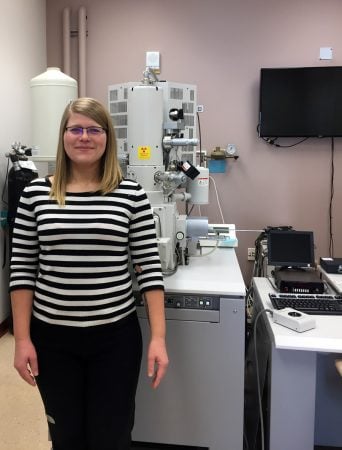Michigan Tech and the Materials Science and Engineering (MSE) department seek a postdoctoral scientist to serve as a specialist in the operation and application of an FEI Titan Themis Scanning Transmission Electron Microscope (STEM) and its associated attachments for interdisciplinary users across campus as well as potential users external to campus.
The ACMAL labs will continue to be open for faculty, staff, graduate students, and undergraduates who’s research cannot be completed from home. If you require access, and have not already let me or Valentina know, please complete the ACMAL Building Access Form.
Prior to using the facility, review the ACMAL COVID-19 Standard Operating Procedure. Our staff will continue to sanitize the labs daily. However, we are now asking all users to complete a touchpoint cleaning after they use the lab.
Please let me know if you have any questions,
ACMAL Calendars Reminder
Please remember to reserve the room using the equipment calendars. This is not only a courtesy to other users, due to COVID restrictions it is a necessity.
Please review ACMAL’s policy on cleanliness and our COVID-19 Standard Operating Procedure (SOP). Below is a brief summary of the key points as well as links to the complete policy and SOP.
- Lab Configuration
- Do NOT change the computer settings.
- It is crucial for other users to find the instruments with the default settings.
- Before exiting the lab after use, return any tools to their default location, and dispose of waste materials.
- Do NOT change the computer settings.
- Personal Items
- Remember to save your data on a personal storage device.
- This is a shared facility, ACMAL is not responsible for, nor can it guarantee, the safekeeping of your personal items, specimens, or data.
- Food and Drink
- Do not bring food or drink in the microscopy labs.
ACMAL COVID-19 Standard Operating Procedure
- Maximum of 2 people in the lab at a time.
- You must bring a mask to the lab with you each time you come to work.
- Be timely.
- To minimize the chance of being unable to maintain social distances do NOT come early for your session to give the previous user time to vacate the lab.
- Finish on time for your session. If you need additional time on the microscope, please update your calendar reservation.
If you have any questions please email me.

Former ACMAL Director Owen Mills retired on June 30, 2020. Everyone in the ACMAL facility and the Department of Materials Science and Engineering wishes Owen the best in his retirement!
Thank you, Owen, for many years of service to the Michigan Tech research and education communities.

I hope everyone is doing well.
As Owen said, my name is Liz Miller and I’m the Senior Laboratory Coordinator for ACMAL. I’ll be taking over for Owen as the main point of contact for our labs. I am available Monday through Friday from 9am – 1pm and by appointment.
Please don’t hesitate to reach out with anything you need. The best way to get a hold of me is by email or phone. You can also find me in M & M Building 626.
Congratulations on your retirement, Owen. The lab won’t be the same without you.
This is the software that Pinaki uses for some of his STEM data.
Extend your research from home
By popular demand, Gatan is extending the limited-time version of Gatan Microscopy Suite (GMS) 3.4.1 software to help the electron microscopy community continue with their research from home.
Similar to the EELS/EDS Quantification and EFTEM analysis plugins, the new version unlocks the DigitalMontage, HREM, and STEMx capabilities. This temporary version is available until June 1, 2020, at no additional cost. Please download the latest package to access these new features and for minor bug fixes.
If you have any questions or need more information, please don’t hesitate to reach out to us.
Best regards,
Gatan
As a result of Dr. Koubek’s email to campus regarding the Governor’s executive order, I am cancelling all use reservations in the calendar this afternoon. We will be ready to begin again after we return from the stay at home 3 weeks from now.
It is important to use the google reservation calendars now in case we need to get in touch with you.
Here are the instructions. https://www.mtu.edu/acmal/access/reservations/
ACMAL lab managers are working within the group, with other Shared Facility directors and the VPR office to formulate lab procedures to be used during this period. You can expect to receive those plans by weeks end. Please feel free to email me any ideas you may have relative to using a facility shared with other faculty and graduate students.
Updated March 13, 2020.
The ACMAL facility will be open during the one month hiatus.
Information for use of the facility during that time is included in this message.
Our overall message to you is please think ahead. If you know you will need help arrange that ahead of time.
Nearly no remote operation.
Most of the ACMAL equipment/software is not compatible with remote operation or remote data analysis. In nearly all cases you will need to come to the facility to work. An exception is two XRD software programs. Ed Laitila can help you access them ealaitil@mtu.edu .
Calendar system.
Use the calendar reservation system to book equipment time. XPS sessions can be scheduled by contacting Tim Leftwich trleftwi@mtu.edu. Avoid bringing multiple people to the lab with you. Work independently as much as possible. Special conditions apply for campus visitors who come to the labs.
Training.
ACMAL staff will do our best to accommodate training during the hiatus period, but it may not be available right away. Again, plan ahead.
Handling ACMAL equipment.
Please wear gloves for all instrument use. ACMAL staff will be cleaning door knobs, sample holders, keyboards and mice, and knob set controls each day. You can cleanse surfaces yourself if you’d like with wipes that will be available next week.
Sickness.
Do not come to the labs sick. Please refer to the University information regarding self-identifying illness and self-isolation. If ACMAL staff are exposed to COVID-19 or infected, a unit in the facility may have to be closed.
Fluid situation.
It is important to note that this situation is changing daily and you should expect adjustments to current policies and procedures. I will send you updates as necessary.
Please let me know if you have any questions or concerns. Contact me if you need help. My phone number is 906-369-1875. I don’t use text very much so call me.